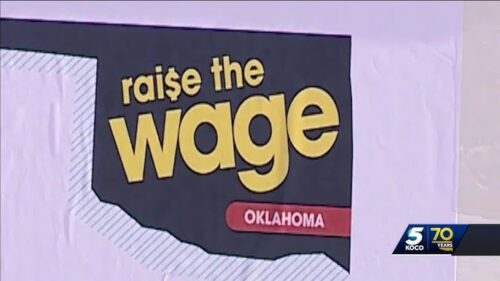
8.12.24 – The Oklahoman
The Oklahoma Secretary of State’s Office has officially verified 157287 petition signatures to put the measure on the ballot – many more than needed.
A petition to gradually raise the minimum wage in Oklahoma, had its signature count verified by the Secretary of State’s office and received 65,024 more signatures than needed to be put on a ballot. Organizers said the state officially verified 157,287 signatures for the ballot measure to raise the minimum wage.
State law required the petition to get 92,263 to make the ballot.
“In just 90 days, our campaign connected with a staggering number of people that were excited to sign the petition to give power to voters and let Oklahomans decide for themselves if the minimum wage should gradually be raised to $15 an hour,” Amber England, a spokesperson for Raise the Wage Oklahoma, said in a media statement announcing the signatures. “Our collective success during this phase of the campaign is a testament to the grassroots movement we’re building that is rooted in the value of hard-work and a commitment to ensuring Oklahoma families can keep up with the cost of living.”
The petition, listed as State Question 832, would gradually raise the minimum wage in Oklahoma from the current $7.25 per hour to $15 in 2029. Future increases would be tied to the cost-of-living index.
What is the next step for State Question 832 to raise Oklahoma minimum wage?
The Secretary of State has submitted the official signature count to the Oklahoma Supreme Court. Oklahoma law sets a 10-business-day protest period once the official notification is posted to a state-wide newspaper. Should the petition clear the protest period, it would the go to the state Election Board and the governor’s office. The governor’s office would, at that point, set the date for the election.
Grading Oklahoma:Is Oklahoma’s minimum wage enough to live on? How wages compares to the rest of the US
“We are confident that the Secretary of State’s office has done a remarkable job certifying the signatures in an efficient and secure manner, “ England said. “We hope politicians and special interest groups with deep pockets representing giant corporations who have tried to block us at every turn will respect the will of voters and forgo any further political maneuvers that would keep this off the ballot. It’s time to let voters decide this issue for ourselves.”
Get the Afternoon Headlines newsletter in your inbox.
Recap of the day’s biggest stories
Delivery: WeekdaysYour Email
Minimum wage petition has faced legal challenges
The petition has generated controversy since its launch.
In April, the Oklaoma Supreme Court turned down a motion to reconsider its earlier ruling that an initiative petition to increase the state’s minimum wage could move ahead.
The request, filed by the State Chamber of Oklahoma and the Oklahoma Farm Bureau Legal Foundation, said a rehearing was needed “to clarify the scope and the impact of (the) court’s decision because the court did not provide an explanation for its conclusions.”
In March the Farm Bureau and the State Chamber sought to stop circulation of the petition, filing a lawsuit with the Oklahoma Supreme Court Both groups asked the state’s high court to assume original jurisdiction of the case and declare the petition “legally insufficient for submission to the voters.”

In its brief, the State Chamber said the petition would result in” higher prices for consumers, fewer jobs for workers and greater failure rates for businesses.” The farm bureau said the initiative petition would undermine its efforts to “support freedoms of farmers and ranchers, the promotion of individual liberties, private property rights and free enterprise.”
Supporters of the petition countered that everyday Oklahomans understand the importance of gradually increasing the minimum wage so that working people can earn a good living and keep up with inflation.
“We look forward to delivering a victory for all the hard-working Oklahomans who desperately need a win at the ballot box,” England’s said at the time. “It’s time to let the people decide.”
